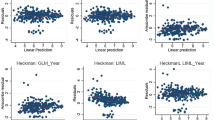Abstract
Background: At least in Germany, it is widely assumed that healthcare-related labour costs weaken the competitiveness of national industries. However, there is a lack of knowledge about the amount of employers’ financial burden in Germany and in other competing countries, as well as the impact on market prices of German goods.
Objective: To quantify the health-related labour costs for employers in seven countries and different industries, and identify the effects of current reforms in Germany on the financial burden of employers.
Methods: We calculated the spending on health in Germany and the burden on German employers (by branch of production). We then compared the total burden with that of six other countries. A univariate analysis was then conducted to examine the connection between health-related labour costs and employment.
Results: In 2000, employers paid 41.2% of the total of €283.3 billion spent on health matters in Germany. These total costs account for 3.2% of the gross output (UK: 1.8%, Switzerland: 1.9%, Poland: 2.1%, US: 3.2%, France: 3.6%, The Netherlands: 3.7%). Health-related labour costs account for 10.6% of the total labour costs. The health-related labour costs per employee are on average €3013 (from €2752 to €4793 in healthcare and the chemical industry, respectively). In the UK and the US there are corresponding labour costs of €1836 and €4256 per employee, respectively.
The current health reform (2003) would reduce the labour costs by only 0.7% after 4 years (based on 2000, with all factors remaining constant). Employment increased by 3.7% from 1995 to 2000 (textile industry: −26.8%, vehicle manufacture: +18.3%). There is no empirical connection between employment and health-related labour costs. Labour costs increased by a higher amount than the health-related labour costs.
Conclusions: The burden on German employers is moderate when compared internationally. The current reform of the German health system is not expected to improve companies’ financial situation or German competitiveness. Restrictions on the range of medical services would provide a relatively small amount of relief for employers.
Similar content being viewed by others
References
Franz W. Arbeitsmarktökonomik. Berlin: Springer, 2003
Fehl U, Oberender P. Mikroökonomie. München: Vahlen, 1999
Riphahn R, Zimmermann KF. Schaffung von Arbeitsplätzen für Geringqualifizierte. Gutachterliche Stellungnahme im Auftrag des Bundesministeriums für Arbeit und Sozialordnung. Bonn: Institut zur Zukunft der Arbeit, 1999
Kaltenborn B, Krug G, Rudolph H, et al. Evaluierung des arbeismarktpolitischen Sonderprogramms CAST (Endbericht). Berlin: Forschungsverbund IAB/IAT/Dr. Kaltenborn 2004
Fitzenberger B, Franz W. Flexibilität der qualifikatorischen Lohnstruktur und Lastverteilung der Arbeitslosigkeit. Eine ökonometrische Analyse für Westdeutschland. In: Gahlen B, Hesse H, Ramser HJ, editors. Verteilungsprobleme der Gegenwart. Tübingen: Mohr Siebeck, 1998: 47–79
Bundesfinanzministerium. Die wichtigsten Steuern im internationalen Vergleich. Berlin: Bundesfinanzministerium, 2003
Schröder C. Industrielle Arbeitskosten im internationalen Vergleich. iw-trends 2003; 3: 1–15
Scharpf FW, Schmidt VA, editors. Welfare and work in the open economy. Oxford: Oxford University Press, 2000
Kemmerling A. The employment effects of different regimes of welfare state taxation: an empirical analysis of core OECD countries. MPIfG Discussion Papers. Köln, 2002. See Max-Planck-Institut für Gesellschaftsforschung, http://www.mpifg-koeln.mpg.de/pu/abstracts/dp02-8.html
OECD. A system of health accounts version 1.0. Paris: OECD, 2000
SVRKAiG. Demographie, Morbidität, Wirtschaftlichkeitsreserven und Beschäftigung. Gesundheitswesen in Deutschland: Kostenfaktor und Zukunftsbranche (Band 1). Baden-Baden: Nomos, 1996
IAB. Die Senkung der Sozialversicherungsbeiträge. IAB werkstattbericht. Nürnberg: Instituts für Arbeitsmark- und Berufsforchung der Bundesanstalt für Arbeit, 1997
Walwei U, Zinka G. Arbeitsmarktwirkungen einer Senkung der Sozialabgaben. Sozialer Fortschr 2005; 4: 77–90
SVR. Staatsfinanzen konsolidieren — Steuersystem reformieren (Jahresgutachten 2003/04). Wiesbaden: Statistisches Bundesamt, http://www.sachverstaendigenrat-wirtschaft.de/download/gutachten/03_ges.pdf#search=%22svr%20Staatsfinanzen%20konsolidieren%20steuersystem%20reformieren%22
Westphal U, Dieckmann O. SYSIFO-ein ökonometrisches Modell der deutschen Volkswirtschaft. Hamburg: Dr. Siegel und Partner, 1995
Fehr H. Welfare effects of dynamic tax reforms. Tübingen: Mohr Siebeck, 1999
Meyer B, Ewerhart G. Lohnsatz, Produktivität und Beschäftigung. Ergebnisse einer Simulationsstudie mit dem disaggregierten ökonometrischen Modell INFORGE. In: Schnabl H, editor. Innovation und Arbeit: Fakten, Analysen, Perspektiven. Tübingen: Mohr Siebeck, 1997: 253–67
Heilemann U. Das RWI-Konjunkturmodell. In: Gaab W, Heilemann U, Wolters J, editors. Arbeiten mit makroökonomischen Modellen. Heidelberg: Physika, 2003: 161–212
Böhringer C, Boeters S, Feil M, et al. Modellinstrumentarium zu ge gesamtwirtschaftlichen Analysen von Arbeitsmarktpolitiken. Nürnberg: Beiträge zur Arbeitsmarkt- und Berufsforschung, 2002
Author information
Authors and Affiliations
Corresponding author
Rights and permissions
About this article
Cite this article
Häussler, B., Ecker, T. & Schneider, M. Do Health-Related Labour Costs Weaken the Competitiveness of the Economy?. PharmacoEconomics 24 (Suppl 2), 59–68 (2006). https://doi.org/10.2165/00019053-200624002-00007
Published:
Issue Date:
DOI: https://doi.org/10.2165/00019053-200624002-00007




